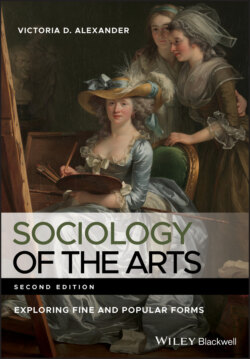Читать книгу Sociology of the Arts - Victoria D. Alexander - Страница 42
The Frankfurt School
ОглавлениеAn important strand of critical theory was written by a group of scholars collectively known as the “Frankfurt School”. They wrote about the popular arts produced by the culture industries, those business firms which produce cultural products for profit. The mass culture produced by these industries is homogenous, standardized, and predictable. Indeed, they argue, mass culture resembles a commodity churned out through mass production techniques. Marx’s concept of commodity fetishism, the idea that people value things in monetary terms, is central here. Cultural commodities are tainted by commodity fetishism, and unlike the authentic arts, they are not valued for themselves, but for their exchange value. Adorno suggests, however, that mass culture products are given some surface difference, a pseudo‐individuality to veil their commodified nature.
This standardized culture is easy to digest, as it requires no critical thinking. In fact, a key function of mass culture is to discourage critical thinking:
the total effect of the culture industry is one of anti‐enlightenment, in which, as Horkheimer and I have noted, enlightenment, that is the progressive technical domination, becomes mass deception and is turned into a means of fettering consciousness. It impedes the development of autonomous, independent individuals who judge and decide consciously for themselves…while obstructing the emancipation for which human beings are as ripe as the productive forces of the epoch permit
(Adorno, 1991 [1941]: 92)
Or as Strinati (2004: 51) phrases it, Adorno “thought that the promise of the Enlightenment to extend human freedom through scientific and rational progress had turned into a nightmare because science and rationality were instead stamping out human freedom.”
As we saw in Chapter 2, Adorno believed that popular music, which is standardized, reflects the mind‐numbing work of industrial capitalism. Further, capitalism requires numb minds. Stimulating the brains of workers, even outside the workplace, undermines this requirement. Popular entertainments have to be as soporific as daily work. As a result, the popular arts are “pre‐digested”—made easy to absorb through standardization—such that workers would not realize just how stupefied they were and would continue to show up day after day. Adorno also argued that the purpose of this mass culture is control and conformity: the very vacuity and banality of commodity culture fools workers into a passive acceptance of the world as it is. This demonstrates that Adorno, like other Marxist writers, saw reflection and shaping working dialectically. The economic base determines (“conditions”) the superstructure. In this way mindless art reflects mindless work. However, the superstructure also shapes the base. Mindless art is passively consumed, so workers do not develop their critical senses. This inability to evaluate their own conditions hides the true nature of capitalism from workers, who thus continue their dreary existence with no hope of release. Authentic art would sharpen their minds, but the workers do not seek out authentic art, because they are too exhausted from their work to attack authentic art with the vigor it demands, and so the cycle continues.
Marcuse (1972 [1964]) suggests that the cultural industries create false needs in consumers. People have true needs to be autonomous—to express themselves and to make decisions about their actions. The cultural industries substitute the false needs of consumption, which keeps workers from realizing that their true needs are not met. Thus, the cultural industries lull workers into a passive acceptance of capitalism, first, by stupefying them and then by convincing them that the freedom to buy one brand over another is an adequate substitute for the true political freedom they would find after casting off the shackles of capitalist production and wage slavery. The products of the cultural industries are imposed on workers, but they also act to hide the imposition and, indeed, encourage workers to actually seek out the distractions proffered.
The arguments of the Frankfurt School are not very flattering to the people who comprise the masses. Indeed, Adorno was accused in his lifetime of elitism. His response was to stress “the vacuity, banality and conformity fostered by the cultural industry. He sees it as a highly destructive force… To ignore the nature of the culture industry, as Adorno defines it, is to succumb to its ideology… [which] is corrupting and manipulative, and underpins the dominance of the market and commodity fetishism” (Strinati, 2004: 56). The Frankfurt school unashamedly favored the fine arts, because they believed that true art is part of an authentic culture that promotes clear and critical thinking. A rejection of the unsatisfying pleasures offered by the popular arts, they suggest, would allow the masses to comprehend their subjugation, it is hoped, with revolutionary effect.
